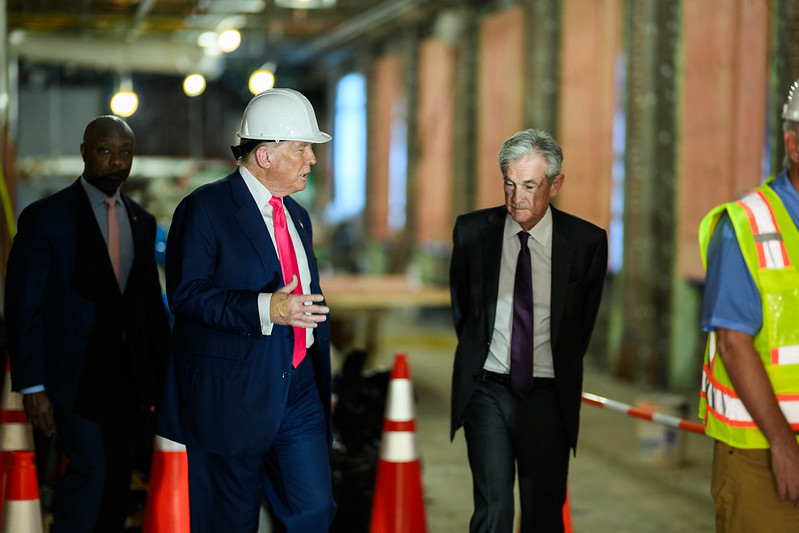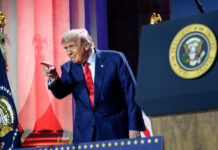
It turns out that if you criticize the Federal Reserve, Wall Street gets angry. Heads of big banks and Wall St. megacorps don’t like that President Donald Trump has called out the Fed for its deficiencies. That could be because over the last sixteen years, the Federal Reserve has done a great job of protecting and even bailing out big banks, while forcing savers and retail investors to suffer through distortionary low interest rates that inflated the money supply and eroded their purchasing power. Ken Griffin, founder and CEO of Citadel, isn’t a fan of President Trump’s criticism of the Federal Reserve. He wrote in The Wall Street Journal:
Runaway inflation during the Biden administration cost the Democrats in the 2024 elections. Rightfully, President Trump and his administration have made controlling inflation a priority. Lower inflation should naturally produce lower interest rates. But statements and actions that undermine the independence of the Fed risk stoking both higher inflation and higher long-term rates. The president’s strategy of publicly criticizing the Fed, suggesting the dismissal of governors, and pressuring the central bank to adopt a more permissive stance toward inflation carries steep costs. These actions raise inflation expectations, increase market risk premiums, and weaken investor confidence in U.S. institutions.
Mr. Trump’s interventions and his dismissal of the head of the Bureau of Labor Statistics have damaged the credibility of official economic data. Together, these developments highlight risks that recall experiences in emerging markets where political influence eroded institutional credibility. While the U.S. benefits from a large stock of credibility accumulated over decades, it isn’t limitless. If eroded, markets will demand far higher interest rates for longer-term debt.
History shows the dangers. In the 1970s, the White House pressured the Fed to keep interest rates artificially low. The central bank’s reluctance to tighten policy as inflation accelerated contributed to a prolonged surge in prices, regarded as one of the Fed’s greatest failures. Research consistently shows that once credibility is compromised, inflation expectations become unanchored, borrowing costs rise, and restoring stability becomes far more difficult.
Pay attention to this line of Griffin’s op-ed (which he co-wrote with Anil K. Kashyap, a Chicago Booth School Business School professor): “But statements and actions that undermine the independence of the Fed risk stoking both higher inflation and higher long-term rates.”
Whose actions have undermined the Federal Reserve more: decades of experimental monetary policy, or President Trump’s recent criticisms? Griffin isn’t the only notable American to opine on the Fed and its independence in The Wall Street Journal recently. Treasury Secretary Scott Bessent made the Trump administration’s case against the Fed’s mission creep last week in the WSJ, concluding:
The Dodd-Frank Act dramatically enlarged the Fed’s supervisory footprint, transforming it into the dominant regulator of U.S. finance. Fifteen years on, the results are disappointing. The 2023 failure of Silicon Valley Bank illustrates the dangers of combining supervision and monetary policy. The Fed now regulates, lends to and sets the profitability calculus for the banks it oversees, an unavoidable conflict that blurs accountability and jeopardizes independence. A more coherent framework would restore specialization: empowering the Federal Deposit Insurance Corp. and Office of the Comptroller of the Currency to lead bank supervision, while leaving the Fed to macro surveillance, lender-of-last-resort liquidity and monetary policy.
At the heart of independence lies credibility and political legitimacy. Both have been jeopardized by the Fed’s expansion beyond its mandate. Heavy intervention has produced severe distributional outcomes, undermined credibility and threatened independence. Looking ahead, the Fed must scale back the distortions it causes in the economy. Unconventional policies such as quantitative easing should be used only in true emergencies, in coordination with the rest of the federal government. There must also be an honest, independent, nonpartisan review of the entire institution, including monetary policy, regulation, communications, staffing and research.
The U.S. faces short- and medium-term economic challenges, along with the long-term consequences of a central bank that has placed its own independence in jeopardy. The Fed’s independence comes from public trust. The central bank must recommit to maintaining the confidence of the American people. To safeguard its future and the stability of the U.S. economy, the Fed must re-establish its credibility as an independent institution focused solely on its statutory mandate of maximum employment, stable prices and moderate long-term interest rates.
Action Line: Criticizing President Trump for an attempt to reel in the untethered Federal Reserve is no surprise from Wall St., where the Fed has kept the lights on for nearly two decades. The path to making America great again isn’t going to be easy. Having Ken Griffin and other big GOP donors come out to defend the Federal Reserve isn’t helping. Maybe Griffin & Co. are more worried about how their own boats could be rocked by a changing Fed than how it might work for the rest of the country. Click here to subscribe to my free monthly Survive & Thrive letter.



